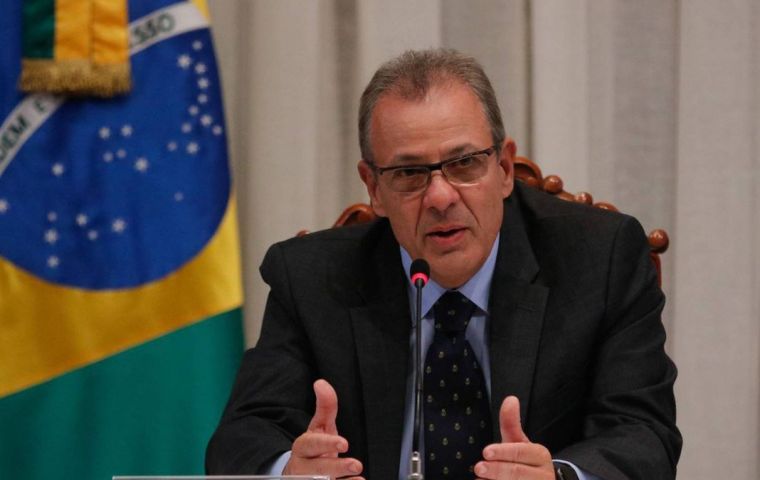MercoPress. South Atlantic News Agency
Energy minister calls for “conscious” use of electricity throughout Brazil
 “The conscientious and responsible use of water and energy will considerably reduce the pressure on the electrical system,” Albuquerque said
“The conscientious and responsible use of water and energy will considerably reduce the pressure on the electrical system,” Albuquerque said Brazil's Mines and Energy Minister Bento Albuquerque Monday launched an appeal for “conscious” use of water and energy in a televised message during which he admitted the seriousness of the current drought and its impact on the production and distribution of electricity.
Albuquerque said the country was going through a time of water crisis and called for “conscious and responsible” use of water and energy by the population, as he highlighted that the last rainy season, mainly in the Southeast and Midwest, was the driest in the last 91 years.
“The conscientious and responsible use of water and energy will considerably reduce the pressure on the electrical system, also reducing the cost of generated energy,” Albuquerque said.
The minister also explained that the current crisis scenario has caused a “natural concern” in many Brazilians about the possibility of energy rationing, fuelled by frightening messages from businessmen in the utility sector who later needed to recant. Albuquerque insisted the situation was under control, although at a higher price.
President Jair Bolsonaro Monday issued a provisional measure that creates an inter-ministerial chamber to manage the water and energy crisis in the country. Albuquerque said the presidential decision aims at “strengthening the governance of the decision-making process.” Provisional measures have the force of law as soon as they are published and must be approved by the National Congress to become definitive laws.
The National Electric Energy Agency (Aneel) will convene Tuesday to define new electricity rates due to the increase in the cost of producing energy from non-hydric plants. The readjustment to be defined by Aneel will take effect from July, when the red tariff flag will be applied, level 2, the highest rate in the system. According to Aneel, reservoir levels are “considerably low”, and the outlook is “unfavourable”.
The current scenario “signals a horizon with reduced hydroelectric production capacity and a high need to activate thermoelectric resources,” Aneel has said. The energy produced by thermoelectric plants is more expensive compared to hydroelectric plants.
“We need to make it clear that the Brazilian electrical system has evolved a lot in recent years. We made historic advances, interconnecting the system on a national scale and doubling the transmission lines,” said Albuquerque.
He added that “we reduced our dependence on hydroelectric plants from 85% to 61%, with the expansion of plants using clean and renewable sources, such as wind, solar and biomass, in addition to natural gas and nuclear thermoelectric plants” and so “today we have a robust electricity sector, which guarantees the supply of electricity to Brazilians.”
The official also explained a voluntary program that encourages companies to shift their consumption from times of higher demand to times of lower demand was being developed.
“These measures are essential, but to increase our energy security, it is essential that, in addition to the sectors of commerce, services and industry, Brazilian society, every citizen-consumers, participates in this effort, avoiding waste in the consumption of electricity, with this, we will be able to minimize the impacts on the daily lives of the population,” he said.
“The conscientious and responsible use of water and energy will considerably reduce the pressure on the electrical system, also reducing the cost of generated energy,” he added.




Top Comments
Disclaimer & comment rules-

Read all commentsWorrisome! Another General with cognitive failure. Brazil spent 13 years (2003/2015) without worrying about energy. 5 years without investments in the electricity sector produces this result.
Jun 29th, 2021 - 01:28 pm 0Imagine a war......General incompetent!
Commenting for this story is now closed.
If you have a Facebook account, become a fan and comment on our Facebook Page!